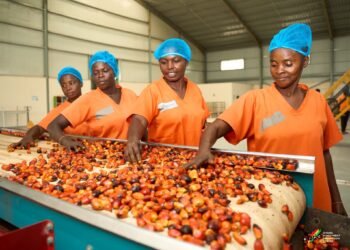In efforts to commit to promoting non-traditional export, the Ghana Export Promotion Authority (GEPA), has presented hybrid seeds worth GHS 90,000 to the Vegetable Producers and Exporters Association of Ghana, (VEPEAG).
The package includes cans of high-grade quality hot pepper cayenne, hot pepper Safi and okro seeds. This is intended to boost the country’s production base and consequently export volumes.
At the presentation ceremony held at the African Trade House in Accra, the Chief Executive Officer of GEPA, Dr. Afua Asabea Asare, said GEPA’s intervention strategy is to sustain the country’s supply of non-traditional export commodities by strengthening and steadily growing its base.
“There is no use developing and promoting ‘Made in Ghana’ produce and making so much noise about it when the expected volumes are not available.”
The Ghana Export Promotion Authority has over the years provided interventions in cashew, pineapple, yam, coconut and now vegetables to ostensibly increase the supply base to achieve high yield to meet export demands.
The intervention comes at a time when stakeholders within the export sector, look forward to putting measures in place as part of their efforts in adjusting to drastic changes presented as a result of the outbreak of coronavirus pandemic on global trade.

While receiving the seeds, the President of VEPEAG, Mr. Felix Yao Kamassah, praised GEPA for the gesture and pledged that the leadership of the Association will oversee the effective distribution of the seeds to members while ensuring the use of best farm practices to aid in conventionality with international standards.
Also, he called on other vegetable producers and exporters to join associations such as VEPEAG to enable them in benefitting from state interventions aimed at resourcing farmers to boost Ghana’s export volume.
Additionally, Mr. Kamassah indicated that with the implementation of the African Continental Free Trade Agreement (AfCFTA), the supply of seeds will help farmers to increase their production to meet the export demand in new markets and position Ghana as a leading vegetable exporter.
The main objectives of the AfCFTA seeking to create a single continental market for goods and services, with free movement of business persons and investments, and thus pave the way for accelerating the establishment of the Customs Union.
Report indicates that, in 2018, agricultural produce contributed a total of 21.01% to Ghana’s total non-traditional exports. Which came second after processed and semi-processed products, topping the chart.























